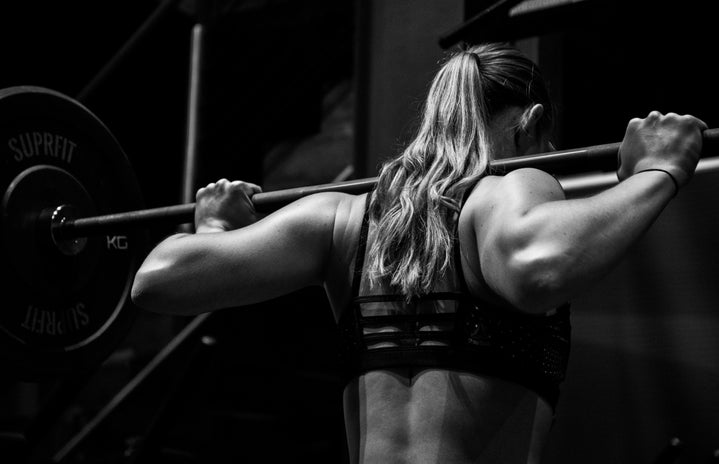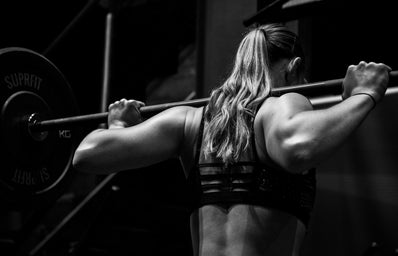My whole life I have been athletic. I played soccer and volleyball, ran track, took dance classes, and generally was just always on the move. I enjoy being in shape and all of the benefits that come with it. Working out is a major stress reliever for me; it makes me feel good about my body, and who doesn’t love some extra endorphins. When I got to college, I was no longer a part of any sports and therefore had to figure something else out as far as fitness went. For a few years, I went to the gym and just kind of winged it. I did a lot of cardio and lifted lighter weights. In the spring time last year, I was on Facebook and saw a girl from my high school had got a personal trainer and got pretty jacked. She had more progress in 3 months than I had ever seen in the 3 years I spent at the gym. So I reached out to a friend who I knew had graduated recently with an exercise science degree and was beginning her career as a personal trainer. That was 6 months ago and I consider it one of the best decisions I ever made. I have seen progress both in how my muscles look (no more noodle arms!) and how strong I feel. In those 6 months, I have learned a lot about weight lifting and have some tips and tricks to get the most out of your workouts. Here are 10 tips to consider when beginning your weight lifting journey.
1. What You Eat Before Matters!
30-60 minutes before lifting (which is breakfast for me) I make sure to get a good meal in. I ran into issues with nausea when I was just grabbing a granola bar or even worse; going on an empty stomach. It only took one time of me throwing up my preworkout to decide I was going to make what I ate before count. Some of the foods I usually go for are oatmeal, eggs, yogurt, toast, etc. These foods have carbs to fill me up and give me energy and protein to keep my muscles strong. I also make a habit of drinking some ginger ale before I go. I like using pre-workout because it improves performance and reduces fatigue but I do find it to be a little hard on my stomach so the ginger ale evens it out. I like to buy the little cans that I can finish in a few sips while going to the gym.
Side note: Be picky with your pre-workout. According to Healthline, pre-workout is a multi-ingredient dietary formula designed to boost energy and athletic performance. This usually comes in the form of a powder that is mixed into water and drunk before a workout. The legitimacy of the benefits of pre-workout is a bit of a controversial topic. It is not FDA regulated and the ingredients in the product vary from brand to brand. Many people are against using pre-workout but just as many swear by it. Before you decide to purchase pre-workout, it’s a good idea to do some research. First, to decide if you want to use it at all. Second, what ingredients you’d like the product to have and how much. Let me make this clear, you can still get a great workout without any supplements, it is really just your preference. If you decide to go the pre-workout route, I suggest looking on Body Building. This website delivers fast and is much cheaper than what you’d pay for the same products at GNC. If you have any side effects or concerns, I would encourage you to stop taking the pre-workout and talk to your doctor.
2. Get Professional Help
Like previously mentioned, getting a personal trainer made all the difference for me. When I decided to start lifting heavy weights, I didn’t know where to start. Getting into an actual weight lifting program was pretty daunting. I didn’t want to injure myself by overdoing it but I also wanted to maximize my time. My personal trainer has helped me tremendously. Each month she creates workout programs for me in Google Sheets and offers me advice and guidance. I often send her videos of my movements and she critiques them to ensure I am using the right form. That’s what has worked for me but if for any reason a PT doesn’t sound like a good fit for you, there is always the option of putting in the extra time and effort into researching weight lifting and creating a plan for yourself. For help with form you can refer to YouTube, where there are videos demonstrating any exercise you can think of.
3. Record Your Weights
Like previously mentioned, my workout programs are in Google Sheets. This allows me to record my weights and keep everything organized. This was a real game changer because each week I can see what I was lifting in prior weeks and it encourages me to go heavier. It is a big motivator. Before this, I would stay on the same weight for months. Now I am always wanting to go heavier just for the gratification of entering a higher number than the week before. However, it’s important to listen to your body. There are weeks I go down in weights or stay the same simply because my body is tired. I don’t feel bad about that. If I am getting in a good workout that’s a win in my book. Those days where I am feeling strong and able to lift much heavier than before, those days feel great.
4. Time Your Rest
My PT stressed the importance of timing your rests, but for whatever reason the first couple months I didn’t. I would just go into the next set whenever I felt I was ready. Now that I actually have started timing my rest, I understand why she got on me about it. If you are wanting to lift heavy you need around 75-120 seconds of rest between sets. That way you can recover and continue to lift to your potential. Another benefit of a PT is that she tells me exactly how much rest I need for any given exercise or superset, but again, this information could easily be found with some research.
5. Take a Day Off
Obviously you have your rest days during the week, but sometimes there’s a day where whether it be for mental or physical reasons; you dread the idea of working out. So don’t. I don’t mean skip a day every week, but missing a day here and there may be exactly what you need to feel refreshed next time you come to the gym. Forcing yourself to workout when it’s the last thing you want to be doing just gives you a bad relationship with the gym. I say this as a person who has consistently gone to the gym for years and I understand that beginners may deal with this more often as they are in the process of making fitness a part of their routine. That’s normal and you should try to stick with a schedule as much as possible but missing a day is really NBD. If you find yourself never wanting to go, maybe reconsider what kind of fitness you are getting into. There are so many ways to exercise, so maybe you’d be more passionate about taking zumba classes or hiking. Just find something that you genuinely enjoy, if that isn’t weight lifting then that’s okay.
6. Chill About The Food
I’m going to probably be going against what many weight lifters suggest. I don’t meal prep, I don’t count macros, I don’t control what I eat at all. Yes, you’ll see the fastest results if you are micromanaging every single thing you put in your mouth but let’s be real; who wants to live like that? And at that point it’s like, are you doing this because you want to be strong and healthy or is it all about outward appearance? Fitness gurus will give you all the tips and tricks; cut carbs, count calories, suppress appetite etc. This is diet culture. It moralizes food by putting it into “good” or “bad” categories. It associates food with guilt. It is fatphobic and promotes disordered eating as healthy. It is not healthy. Listen to your body. If you are hungry, EAT. And eat what you are hungry for. If you are craving something, it means your body needs the nutrients from that certain food. I eat pasta several times a week. The world has yet to end.
7. Protein Shakes Are Your Friend
With that being said about what you eat, I think protein shakes help you get the most out of your workouts. When you lift weights, you are creating microscopic tears in your muscles. This sounds awful but it is actually exactly what you want to do because as the muscles repairs it becomes better than before in order to handle future “damage”. Protein plays a big role in repairing muscles, and therefore having a protein rich diet is beneficial when weight lifting. I definitely struggle in this department as I am a pescatarian who loves carbs. Drinking a protein shake adds 30 grams of extra protein a day for me and as much as I have an aversion to their taste, I can chug one down pretty quickly to enjoy it’s benefits. Let me be clear though; they ARE NOT a meal substitute. I see so many companies selling these “weight loss shakes” that essentially are meal replacement protein shakes. Sure, you’ll lose weight, but it’s just because you are having a 200 calorie meal. Nobody can live like that for more than a couple weeks so in the long run it is doing nothing for you but draining your bank account.
9.) Hypertrophy or Strength Training?
Short answer: both! First of all it is essential to understand the difference between the two. Hypertrophy training is “training with the intent to increase muscle size, or to gain additional muscle mass” while strength training is to make muscles stronger. My PT has me alternating months between hypertrophy and strength training. During hypertrophy, I do higher rep exercises. This usually is 12 reps and 4 sets of each exercise. During strength, I do lower rep exercises. Currently, I am on a program that I am doing a lot of 5 reps 5 sets or 8 reps 4 sets. I definitely enjoy strength months more because they make me feel very strong, you can obviously lift a lot more for 5 reps than 12. However, I really do like hypertrophy as well. Sometimes after a workout in a hypertrophy month, I add up how many reps I did total during my workout and I feel very accomplished. It is beneficial to do both simply because you get stronger in your strength months so you can get those gains in your hypertrophy months!
10.) Form Form Form
Lifting heavy weights can be dangerous and while it is great to go up in weights, it is essential to only go up to a weight that you can still do correct form in. Never compromise form to go heavier.

